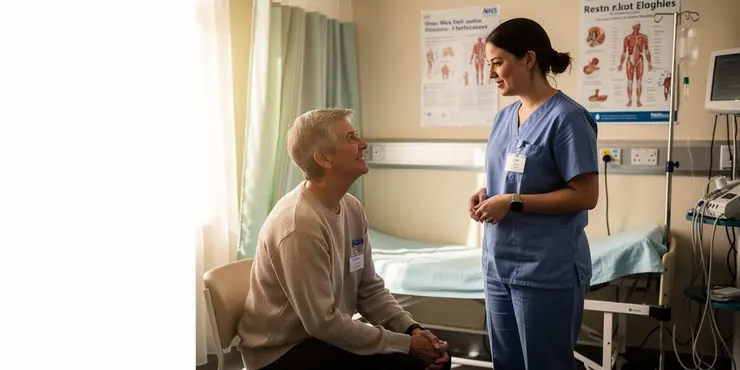
Find Help
More Items From Ergsy search
-
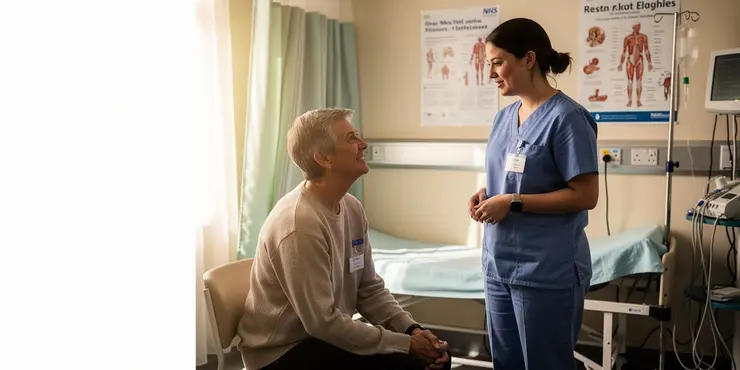
What are the primary symptoms of motor neurone disease?
Relevance: 100%
-
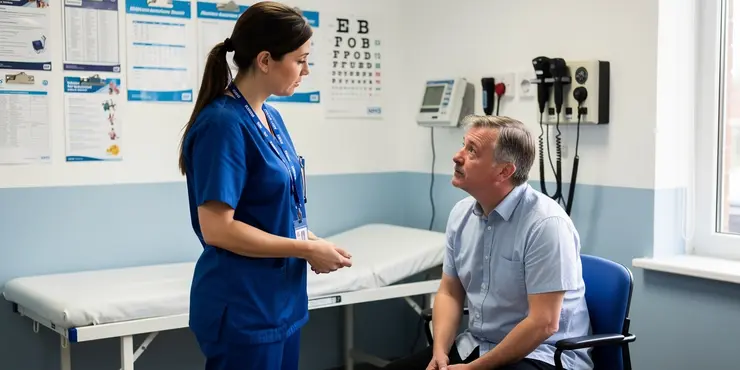
What is motor neurone disease?
Relevance: 87%
-
Are there different types of motor neurone disease?
Relevance: 83%
-
Is motor neurone disease hereditary?
Relevance: 80%
-

What causes motor neurone disease?
Relevance: 78%
-
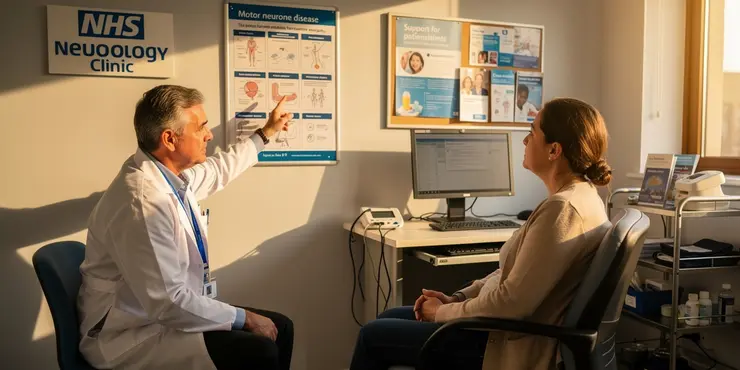
Is there a cure for motor neurone disease?
Relevance: 78%
-

What treatments are available for motor neurone disease?
Relevance: 74%
-

How is breathing affected by motor neurone disease?
Relevance: 73%
-
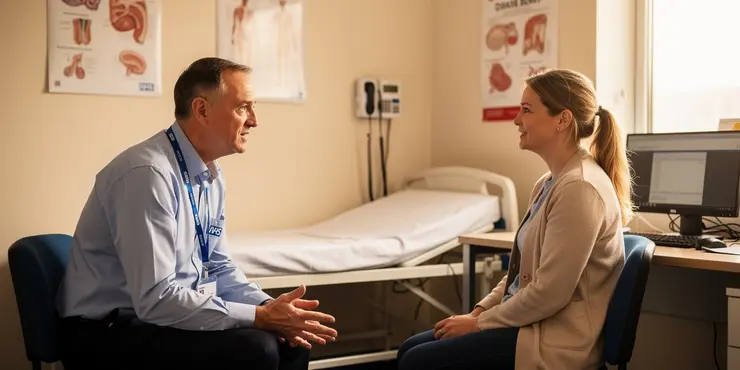
How is motor neurone disease diagnosed?
Relevance: 73%
-
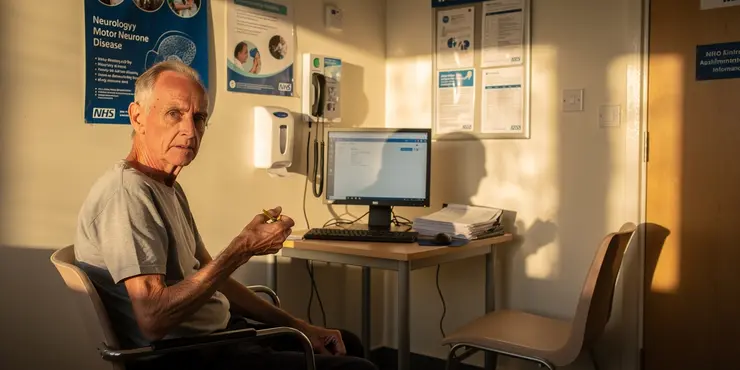
How does motor neurone disease affect the body?
Relevance: 68%
-

What role do genetics play in motor neurone disease?
Relevance: 68%
-
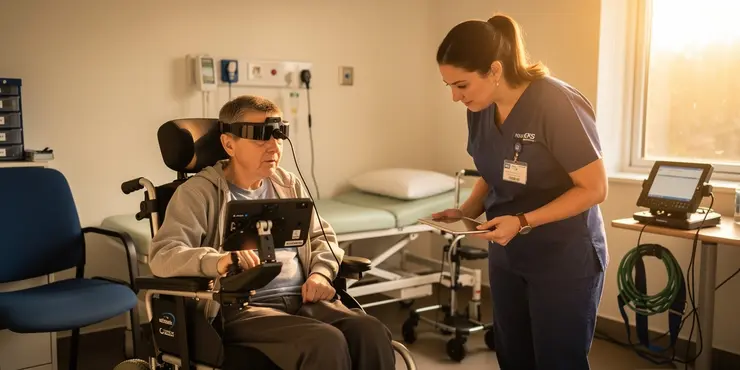
What assistive devices can help people with motor neurone disease?
Relevance: 68%
-

Motor neurone disease Julie's story | NHS
Relevance: 67%
-
How does motor neurone disease affect speech?
Relevance: 66%
-
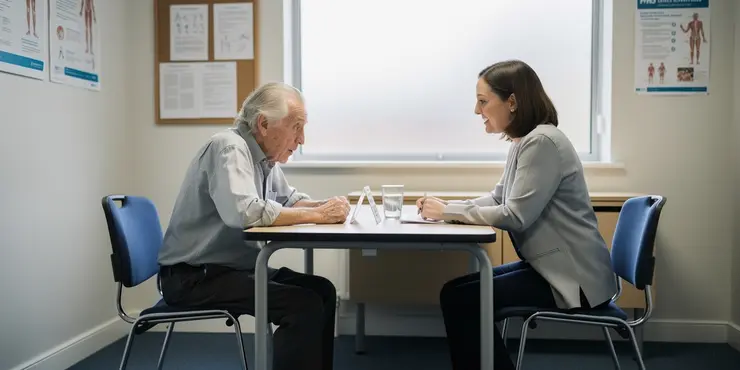
How does motor neurone disease impact swallowing?
Relevance: 64%
-
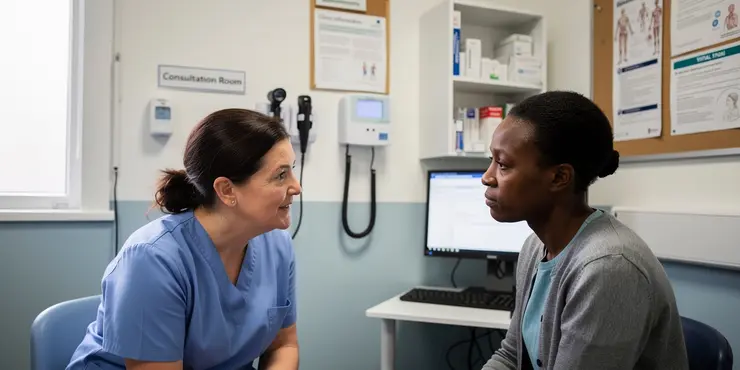
What is the life expectancy after a motor neurone disease diagnosis?
Relevance: 64%
-
Can lifestyle changes impact motor neurone disease progression?
Relevance: 61%
-

Voice banking service helps people live with motor neurone disease
Relevance: 59%
-

How can caregivers support someone with motor neurone disease?
Relevance: 57%
-

Are there support groups for individuals with motor neurone disease?
Relevance: 53%
-
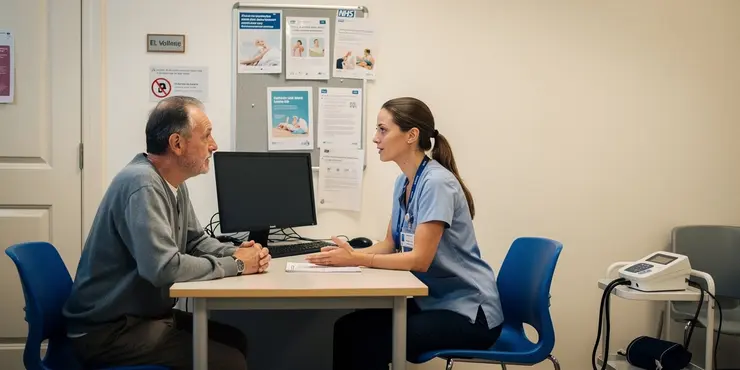
Who is at risk for motor neurone disease?
Relevance: 51%
-
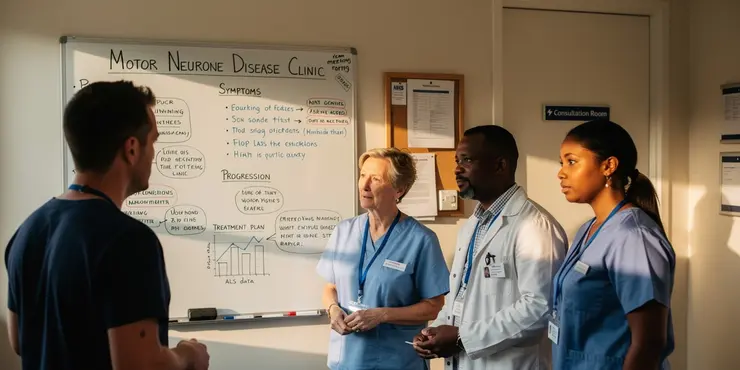
What research is being done on motor neurone disease?
Relevance: 50%
-

What are the symptoms of Huntington's disease?
Relevance: 42%
-

What is MND?
Relevance: 36%
-
How does Huntington's disease affect movement?
Relevance: 36%
-
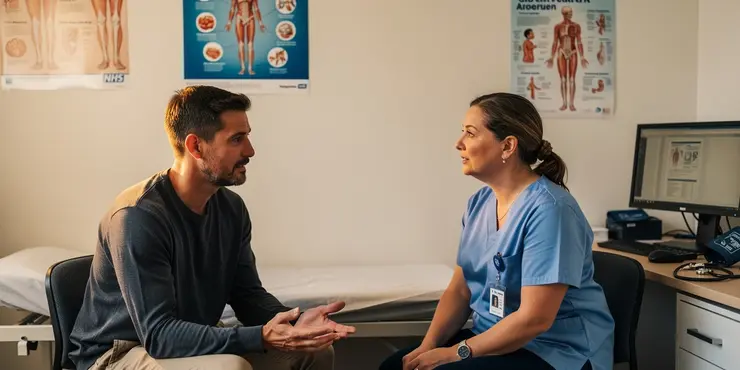
What causes Huntington's disease?
Relevance: 33%
-

Symptoms of coeliac disease
Relevance: 33%
-
What is Parkinson's disease?
Relevance: 32%
-

What are common symptoms of Lyme disease?
Relevance: 30%
-

What are the common symptoms of Crohn's disease?
Relevance: 29%
-

What are the symptoms of Marburg virus disease?
Relevance: 29%
-

What are the symptoms of sickle cell disease?
Relevance: 29%
-

What are the symptoms of flesh-eating disease?
Relevance: 29%
-

Is Huntington's disease fatal?
Relevance: 29%
-

What are the symptoms of Alzheimer's disease?
Relevance: 28%
-

What symptoms should I watch for if I suspect a mosquito-borne disease?
Relevance: 27%
-
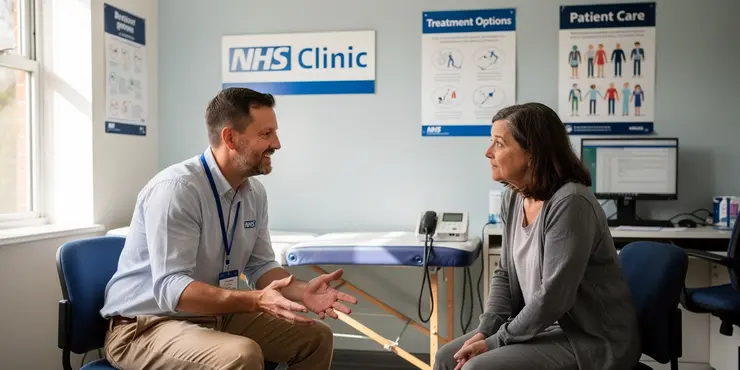
What research is being done on Huntington's disease?
Relevance: 27%
-

Are there opportunities for specialization in primary care support?
Relevance: 27%
-

At what age do symptoms of Huntington's disease typically appear?
Relevance: 26%
-

How is Huntington's disease diagnosed?
Relevance: 26%
What is Motor Neurone Disease?
Motor Neurone Disease (MND) is a progressive neurological condition that affects the nerves in the brain and spinal cord. These nerves, known as motor neurones, control the muscles in the body, affecting breathing, speaking, swallowing, and movement. As the disease progresses, these muscles weaken, leading to an increasing loss of mobility and worsening of symptoms. Recognizing the symptoms early can help in managing the disease effectively.
Primary Symptoms of Motor Neurone Disease
MND symptoms vary from person to person, as the disease can affect different parts of the body and progress at different rates. However, there are common primary symptoms that most individuals with MND experience.
Muscle Weakness
Muscle weakness is one of the initial and most prevalent symptoms of MND. It often starts gradually, with individuals noticing weakness in their hands or feet. This may manifest as difficulty in gripping objects, climbing stairs, or frequent tripping.
Muscle Wasting
The weakening of muscles eventually leads to muscle wasting, where the muscle tissue begins to reduce in size. This can be observed as thinning of the muscles, usually in the arms or legs, giving a more pronounced appearance of the bones.
Muscle Twitching and Cramps
People with MND may experience muscle twitching, known as fasciculations, which are uncontrollable and usually not painful. Muscle cramps can also occur, leading to discomfort and difficulty performing tasks.
Changes in Speech and Swallowing
MND can affect muscles used for speaking and swallowing. This can result in slurred speech, difficulty articulating words, or a hoarse voice. Swallowing difficulties, known as dysphagia, can lead to choking or an increased risk of aspiration.
Breathing Problems
As MND progresses, it can affect the respiratory muscles, making it difficult to breathe. Individuals might experience shortness of breath, especially when lying down, and may require ventilatory support as the disease advances.
Emotional and Cognitive Changes
While MND primarily affects motor functions, some individuals may experience changes in their emotional state or cognition. This can include mood swings, depression, or changes in behavior. In some cases, it can lead to a type of dementia known as frontotemporal dementia.
Conclusion
Although there is currently no cure for MND, early detection and diagnosis can help manage the symptoms and improve the quality of life for those affected. It is important for individuals experiencing any of these symptoms to seek medical advice promptly.
What is Motor Neurone Disease?
Motor Neurone Disease (MND) is a sickness that gets worse over time. It affects the nerves in your brain and spine. These nerves help you move your muscles. When they don't work right, it can be hard to breathe, talk, swallow, and move. Muscles get weaker. Spotting signs early can help manage the disease better.
Main Signs of Motor Neurone Disease
MND signs can be different for each person. The sickness can hit different body parts and can go fast or slow. But there are some common signs that most people with MND have.
Muscle Weakness
Muscle weakness is one of the first signs. It starts slowly. People might find it hard to hold things, go up stairs, or they might trip a lot.
Muscle Wasting
As muscles get weaker, they start to get smaller. This is called muscle wasting. You might see it in the arms or legs. The muscles look thinner and you can see the bones more.
Muscle Twitching and Cramps
People with MND might feel muscles twitch. This is called fasciculations. Twitches usually don't hurt. Muscle cramps can also happen. Cramps might make you feel uncomfortable and make it hard to do things.
Changes in Speech and Swallowing
MND can make speaking and swallowing hard. People might talk in a slurred way or have a hoarse voice. Swallowing can become difficult, and sometimes people may choke.
Breathing Problems
As MND gets worse, it can affect breathing muscles. People might feel out of breath, especially when lying down. They might need help to breathe as the disease progresses.
Emotional and Thinking Changes
MND mainly affects how you move, but it can also change how you feel or think. Some people might have mood swings, feel sad, or act differently. Sometimes, it can cause a type of dementia called frontotemporal dementia.
Conclusion
There is no cure for MND right now. But finding it early can help manage the signs and improve life for people with the disease. If you notice any of these signs, it's important to talk to a doctor.
Frequently Asked Questions
What are the early symptoms of motor neurone disease?
Early symptoms often include muscle weakness, especially in the arms and legs, and difficulty with fine motor tasks.
Can speech problems be a symptom of motor neurone disease?
Yes, individuals may experience slurred speech or difficulty with articulation as the disease progresses.
Does motor neurone disease cause muscle cramps?
Muscle cramps and twitching are common symptoms associated with motor neurone disease.
Are changes in breathing a symptom of motor neurone disease?
As the disease advances, it can affect muscles involved in breathing, leading to respiratory problems.
How does motor neurone disease affect mobility?
Mobility can be significantly impacted due to muscle weakness and wasting, leading to difficulty walking.
Does motor neurone disease cause difficulty swallowing?
Yes, difficulty swallowing is a common symptom as muscles involved in this process become affected.
What are common symptoms affecting the hands in motor neurone disease?
Weakness and atrophy of the hand muscles can occur, making it hard to perform simple tasks.
Can motor neurone disease affect facial muscles?
Yes, weakness in facial muscles can lead to difficulties with facial expressions.
Is muscle stiffness a symptom of motor neurone disease?
Muscle stiffness and spasticity are often seen as the disease progresses.
Do motor neurone disease symptoms progress over time?
Yes, symptoms typically progress, leading to increased disability over time.
Can motor neurone disease lead to weight loss?
Weight loss can occur due to muscle wasting and difficulties with eating and swallowing.
Are there different patterns of symptoms in motor neurone disease?
Yes, symptoms can start in various parts of the body depending on the type and progression of the disease.
How does motor neurone disease affect the legs?
Leg weakness and muscle atrophy can lead to falls and difficulty walking.
Is there pain associated with motor neurone disease?
While the disease itself is not typically painful, discomfort can arise from muscle cramps and immobility.
Are there cognitive symptoms in motor neurone disease?
Some patients may experience cognitive changes, although motor symptoms are most prominent.
Do all individuals with motor neurone disease experience the same symptoms?
No, symptoms can vary widely between individuals in terms of severity and progression.
Can emotional changes occur with motor neurone disease?
Emotional lability, or difficulty controlling emotions, can be a symptom in some cases.
Is fatigue a symptom of motor neurone disease?
Yes, fatigue is a common symptom due to the increased effort needed to move weakened muscles.
Does motor neurone disease affect the senses?
The senses are typically not affected, as motor neurone disease primarily impacts muscle control.
What should one do if they suspect symptoms of motor neurone disease?
Consult a healthcare provider for a thorough evaluation and diagnosis if symptoms of concern arise.
What are the first signs of motor neurone disease?
Motor neurone disease (MND) is a sickness that hurts your nerves. Here are some common first signs:
- Weak muscles: Your arms or legs might feel tired and weak.
- Muscle cramps: You might feel sudden pain in your muscles.
- Twitching: Your muscles might twitch or jerk by themselves.
- Stiffness: Your body might feel stiff and hard to move.
- Trouble speaking or swallowing: It might be hard to talk or swallow food.
If you think you have any of these signs, tell a doctor. They can help you a lot. You can also use pictures, videos, or a support tool like a communication board to understand better.
First signs are often feeling weak in your muscles. This can happen in your arms and legs. It can also be hard to do small tasks, like buttoning a shirt.
Can speech problems be a sign of motor neurone disease?
Motor neurone disease (MND) is an illness that affects how nerves work in the body. Sometimes, people with MND may have trouble talking. This can make it hard for them to speak clearly.
Signs that MND might be causing speech problems include:
- Slurred speech (words not sounding clear)
- Speaking slowly or finding it hard to talk
If you think someone might have these problems, it's good to see a doctor. They can help find out if it is MND or something else.
Using picture cards or writing down words can help with communication for someone having speech problems. Speech therapists can also offer support and exercises to help them talk more easily.
Yes, as the disease gets worse, some people might find it hard to speak clearly.
Can motor neurone disease make muscles cramp?
Motor neurone disease (MND) is a sickness that can make muscles get weak. It can also make muscles cramp, which means they get tight and hurt.
If you have muscle cramps that hurt a lot, you can:
- Talk to a doctor. They can help.
- Try gentle stretching. This can help muscles feel better.
- Drink water. Staying hydrated helps muscles.
Remember, it is okay to ask for help if you need it.
Muscle cramps and twitching are signs you might have motor neurone disease.
Can motor neurone disease make it hard to breathe?
As the illness gets worse, it can make the breathing muscles weak, which can cause breathing problems.
How does motor neurone disease affect movement?
Motor neurone disease (MND) makes it hard for the body to move. This is because the nerves that help muscles work are not healthy.
People with MND may find it tough to walk, run, or even hold things. Muscles might feel weak and tired.
It is important to get help. Physical therapy and special tools like wheelchairs can make it easier to move and do daily tasks.
When your muscles get weak and smaller, it can be hard to move around. This makes walking difficult.
Here are some tools and techniques that can help:
- Use a walking cane or walker for support.
- Do simple exercises to make your muscles stronger.
- Ask someone for help when you need to walk.
- Try using special shoes that make walking easier.
Can motor neurone disease make it hard to swallow?
Yes, it can be hard to swallow because the muscles used for swallowing may not work well.
What problems with the hands happen in motor neurone disease?
Motor neurone disease (MND) can make your hands feel weak or clumsy. You might find it hard to hold things or do tasks like buttoning a shirt. Some people might notice their muscles getting smaller.
To help, you can use tools like easy-grip cutlery or button hooks. An occupational therapist can show you helpful ways to do daily tasks.
When the muscles in your hand get weak and small, it can be hard to do easy things.
Can motor neurone disease affect face muscles?
Yes, motor neurone disease can make face muscles weak. This can make it hard to smile or talk. If you need help, you can use picture cards or talk with a speech therapist. They can help you feel better and talk with others.
Yes, weak face muscles can make it hard to show emotions on your face.
Can muscle stiffness be a sign of motor neurone disease?
Muscle stiffness means your muscles feel tight and hard to move.
Motor neurone disease is a serious illness that affects the nerves in your body.
If you have muscle stiffness, talk to a doctor.
They can do tests to find out why your muscles are stiff.
Using a warm towel or taking a warm bath can help relax muscles.
As the illness gets worse, muscles can feel tight and hard to move.
Do the signs of motor neurone disease get worse over time?
Motor neurone disease (MND) affects the nerves in the body. This can make some muscles weak. Over time, the signs of MND can get worse. This means someone with MND might find it more difficult to move, speak, or breathe.
If you want to know more, you can talk to a doctor or a nurse. They can answer questions and help you understand MND better.
It can also help to write down things you want to ask. This way, you won't forget your questions when you talk to a doctor.
Yes, signs usually get worse. This means people can find it harder to do things as time goes on.
Can motor neurone disease cause weight loss?
Yes, people with motor neurone disease (MND) can lose weight. This can happen because:
- It might be hard to chew or swallow food.
- Muscles become weak.
- It takes more energy to do things.
To help with this, people can:
- Eat small meals often.
- Try soft or mashed foods.
- Use special tools like bendy spoons or cups with lids.
- Talk to a doctor or dietitian for more advice.
Sometimes we lose weight because our muscles get smaller. This can also happen if we have trouble eating or swallowing food.
Do people with motor neurone disease have different signs?
Motor neurone disease, or MND, is an illness that affects the nerves in your body that help you move your muscles.
People with MND can have different signs, or symptoms. This means that not everyone with MND feels the same things.
Some common signs are:
- Weak muscles
- Trouble walking
- Speaking problems
- Hard to swallow
If you want to learn more, you can ask a doctor to explain. Pictures or videos about MND might also help you understand better.
Yes, signs of being sick can show up in different places in your body. It depends on what kind of sickness you have and how it is getting worse.
What happens to your legs if you have motor neurone disease?
Motor neurone disease is an illness that makes the nerves in your body get weaker. These nerves help your muscles work. When they don't work well, your legs can get weak.
Here’s what might happen to your legs:
- Your legs might feel tired all the time.
- It might be hard to walk or stand up.
- Your legs might shake or twitch.
- You might fall more often because your legs are weak.
If you need help, talk to a doctor. They know how to make things easier for you. You can also try using a cane or walker to help you move around safely.
Weak legs and small muscles can make it hard to walk and might cause falls.
Does motor neurone disease cause pain?
Some people with motor neurone disease feel pain. This can happen because muscles get stiff or weak.
Not everyone with the disease feels pain. Everyone is different.
If you do feel pain, you can talk to a doctor. They can help with medicine or other treatments to make you feel better.
It can also help to stay active and have support from friends and family.
The disease does not usually hurt. But it can feel uncomfortable because of muscle cramps and not being able to move much.
Can motor neurone disease affect the brain?
Motor neurone disease (MND) can sometimes change how a person thinks or remembers things.
Here are some signs you might notice:
- Trouble remembering things
- Finding it hard to focus or pay attention
- Feeling confused sometimes
If you notice these changes, it can help to:
- Write things down to remember them
- Use simple checklists to help with tasks
- Ask someone for help if needed
Some people might find it harder to think or remember things, but usually, problems with moving are the biggest sign.
Do all people with motor neurone disease have the same symptoms?
No, people with motor neurone disease can have different symptoms. This means not everyone feels the same way.
Some might have weak muscles or trouble moving. Others might find it hard to speak or swallow.
If you want help, you can:
- Talk to a doctor or nurse.
- Ask someone to help you read and understand.
- Use picture tools or apps that read out loud.
No, symptoms are different for each person. Some people might feel them more strongly, and they can change over time.
Do feelings change if you have motor neurone disease?
Sometimes, people find it hard to control their feelings. This can be a sign of something called emotional lability.
Does motor neurone disease make you feel very tired?
Yes, having motor neurone disease (MND) can make you feel very tired. This tiredness is called fatigue. It is a common sign that you might have MND.
Here are ways to help you manage feeling tired:
- Take short rest breaks during the day.
- Ask for help with activities when you feel too tired.
- Keep a good sleep routine at night.
- Talk to your doctor if your tiredness is too much.
Remember, it is important to tell someone if you are feeling very tired.
Yes, feeling very tired is common. This is because your muscles have to work harder if they are weak.
Does motor neurone disease affect the senses?
Motor neurone disease (MND) is an illness that harms the nerves in your body.
MND can make it hard to move, but it does not usually change how you feel things with your senses.
This means you can still see, hear, taste, smell, and touch things as usual.
If you find reading hard, you can use tools like audiobooks that read the words to you or ask someone to help explain things.
The senses, like sight and hearing, usually stay the same. This is because motor neurone disease mainly affects how muscles work.
What to Do If You Think You Have Signs of Motor Neurone Disease
If you think you have signs of motor neurone disease, tell a doctor.
Here’s what to do:
- Write down any signs you have noticed.
- Tell your family or friends how you feel.
- Go to a doctor to talk about your signs.
If the doctor thinks you might have motor neurone disease, they might send you to a special doctor called a neurologist.
It's important to get help soon so you can feel better.
See a doctor to check what's wrong if you feel sick or worried about your health.
Useful Links
This website offers general information and is not a substitute for professional advice.
Always seek guidance from qualified professionals.
If you have any medical concerns or need urgent help, contact a healthcare professional or emergency services immediately.
Some of this content was generated with AI assistance. We’ve done our best to keep it accurate, helpful, and human-friendly.
- Ergsy carfully checks the information in the videos we provide here.
- Videos shown by Youtube after a video has completed, have NOT been reviewed by ERGSY.
- To view, click the arrow in centre of video.
- Most of the videos you find here will have subtitles and/or closed captions available.
- You may need to turn these on, and choose your preferred language.
- Go to the video you'd like to watch.
- If closed captions (CC) are available, settings will be visible on the bottom right of the video player.
- To turn on Captions, click settings .
- To turn off Captions, click settings again.
More Items From Ergsy search
-

What are the primary symptoms of motor neurone disease?
Relevance: 100%
-

What is motor neurone disease?
Relevance: 87%
-
Are there different types of motor neurone disease?
Relevance: 83%
-
Is motor neurone disease hereditary?
Relevance: 80%
-

What causes motor neurone disease?
Relevance: 78%
-

Is there a cure for motor neurone disease?
Relevance: 78%
-

What treatments are available for motor neurone disease?
Relevance: 74%
-

How is breathing affected by motor neurone disease?
Relevance: 73%
-

How is motor neurone disease diagnosed?
Relevance: 73%
-

How does motor neurone disease affect the body?
Relevance: 68%
-

What role do genetics play in motor neurone disease?
Relevance: 68%
-

What assistive devices can help people with motor neurone disease?
Relevance: 68%
-

Motor neurone disease Julie's story | NHS
Relevance: 67%
-
How does motor neurone disease affect speech?
Relevance: 66%
-

How does motor neurone disease impact swallowing?
Relevance: 64%
-

What is the life expectancy after a motor neurone disease diagnosis?
Relevance: 64%
-
Can lifestyle changes impact motor neurone disease progression?
Relevance: 61%
-

Voice banking service helps people live with motor neurone disease
Relevance: 59%
-

How can caregivers support someone with motor neurone disease?
Relevance: 57%
-

Are there support groups for individuals with motor neurone disease?
Relevance: 53%
-

Who is at risk for motor neurone disease?
Relevance: 51%
-

What research is being done on motor neurone disease?
Relevance: 50%
-

What are the symptoms of Huntington's disease?
Relevance: 42%
-

What is MND?
Relevance: 36%
-
How does Huntington's disease affect movement?
Relevance: 36%
-

What causes Huntington's disease?
Relevance: 33%
-

Symptoms of coeliac disease
Relevance: 33%
-
What is Parkinson's disease?
Relevance: 32%
-

What are common symptoms of Lyme disease?
Relevance: 30%
-

What are the common symptoms of Crohn's disease?
Relevance: 29%
-

What are the symptoms of Marburg virus disease?
Relevance: 29%
-

What are the symptoms of sickle cell disease?
Relevance: 29%
-

What are the symptoms of flesh-eating disease?
Relevance: 29%
-

Is Huntington's disease fatal?
Relevance: 29%
-

What are the symptoms of Alzheimer's disease?
Relevance: 28%
-

What symptoms should I watch for if I suspect a mosquito-borne disease?
Relevance: 27%
-

What research is being done on Huntington's disease?
Relevance: 27%
-

Are there opportunities for specialization in primary care support?
Relevance: 27%
-

At what age do symptoms of Huntington's disease typically appear?
Relevance: 26%
-

How is Huntington's disease diagnosed?
Relevance: 26%


